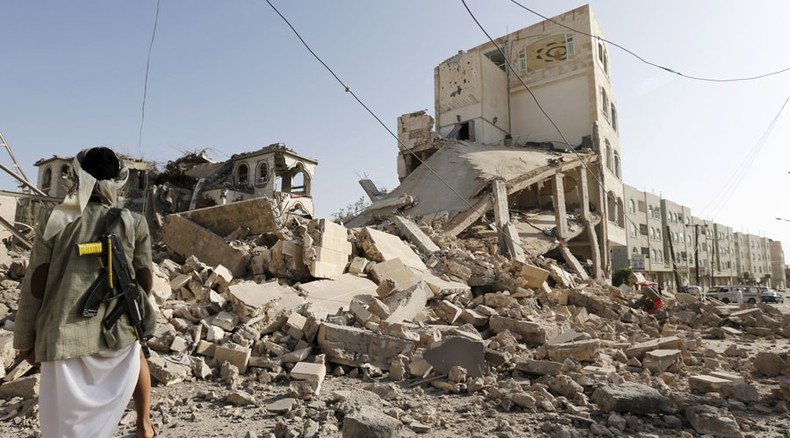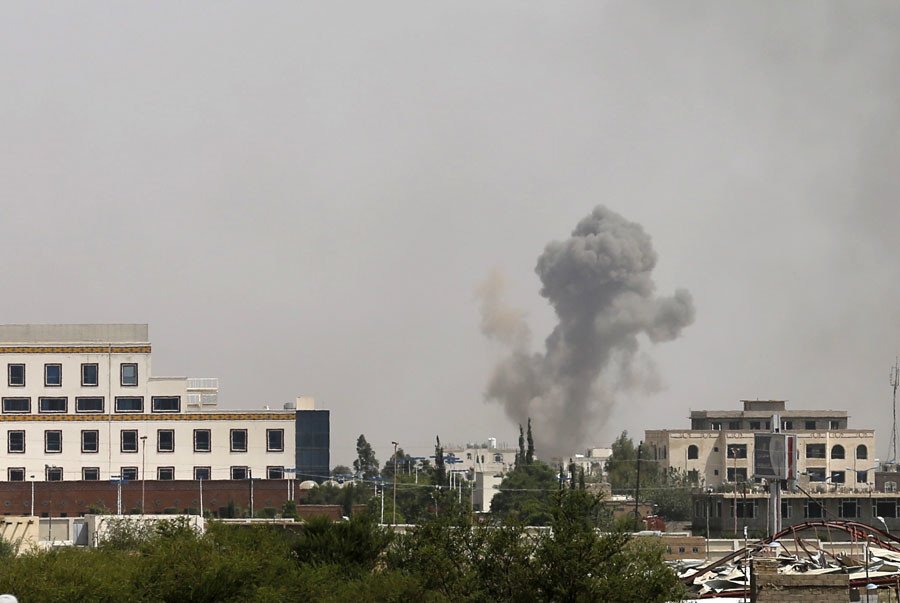Return of the Wahhabis: The Al-Qaeda connection & plausible political deniability

Al-Qaeda is back. This time around it brought with it another religious aberration: ISIS. With Yemen fast becoming an incubus for all things radical, Riyadh insists the real enemy is the Resistance. The trick here is to discern the terrorist from the freedom fighter.
With Saudi Arabia and the GCC countries busy engineering the annihilation of Yemen by way of ground invasion and air raids we almost forgot that behind the towering shadow of the oil kingdom, radicalism's legions are standing by, awaiting for opportunity to knock.
And since Yemen now stands in a state of free fall, very much alone and shunned by the international community for its people could not eclipse the financial and political incentives put forward by wealthy Saudi Arabia, the likes of Al-Qaeda and ISIS radicals have returned to the land of Sheba, bombs at the ready, poison foaming at the mouth.
While Yemen's battle against Wahhabi-inspired radicalism is hardly breaking news – Al-Qaeda has had a foothold in southern Arabia for over a decade - terror militants' timing and geographic preferences are somewhat disturbing as they appear to not only mirror Saudi Arabia's advances in the country, but share in the kingdom's military strategy against the Resistance movement.
But of course suggesting that Saudi Arabia would ever manipulate - or worse - collude with radical groups to score personal political points against its enemies, while playing the diplomatic deniability card would be completely preposterous. Right?
Hold on … the kingdom actually is playing that game. It has been for quite some time too: Syria and Iraq come to mind in the ever expanding radical footprint Riyadh has helped promote in the MENA (Middle East and North Africa).
For those still wondering, Yemen is fast becoming the new Syria - at least as far as using Wahhabi-inspired radicalism goes. Bearing in mind that US senior officials have managed to rationalize Washington's support of so-called "moderates" in Syria as part of a concerted strategy against President Bashar Assad, one can only wonder what "excuses" will be used by the kingdom to facilitate the demise of independent Yemen.
At this particular juncture in time and as analysts have so kindly shared, Al-Qaeda's activities in Yemen are not exactly a grave concern. Ibrahim Fraihat, a senior fellow at the Brookings Doha Center put it this way: “The Houthis are more of a high priority.” An interesting perspective if you ask me since we were told ad nauseam by Western powers and their allies that terror was the one threat the world could not afford to shy away from.
Has something changed in between the many foreign military occupation campaigns we have had the privilege of witnessing over the years?
Another question begs answering - Since the Houthis are the only force in Yemen which can claim to be completely devoted to the eradication of Wahhabi -induced terrorism, why is Riyadh so intent on breaking its ranks?
We know it's not democracy building, and Riyadh can't possibly be so attached to President Abd Rabbo Mansour Hadi that it would risk blowing up the entire region for the sake of this one man political legacy. If Hadi makes a perfect political pawn, this functionless politician simply cannot claim to carry enough traction to manifest any form of a national political consensus - let alone lead Yemen back to a place of stability.
Then what?

Well there is always control over the world oil route and Yemen's natural resources. There is also this little matter called geostrategy and of course Saudi Arabia's rampant hegemonic ambition … But the answer could still lie beyond such considerations, while not excluding any of the aforementioned points.
There is a dichotomy in between what regional powers have said their goals are and the policies they have carried out on the ground. The faster we wrap all of our heads around this, the faster will we be able to peer through the thick propaganda screen.
In Yemen, Saudi Arabia's main goal has always been control - control over Yemen's oil resources, control over Yemen's military apparatus, control over Yemen's political and institutional life, control over Yemen's geographic access and control over Yemen's religious ideology.
To achieve such control, the kingdom has already proven it will stoop as low as targeting students as they sit their exams, deploy illegal weapons of war against civilian populations or even organize a blockade in the hope hunger and desperation will induce civil unrest to its benefit.
Where does the Saudi train stop? More importantly when will the international community end its self-imposed blindness?
Do we draw a line at the exploitation of terror as a new weapon of social mass destruction and political engineering? Can we actually pretend that terror's return to Yemen is a coincidence and not another arrow to Riyadh's military strategy bow?
Let me put it to you this way. If Riyadh has been able, courtesy of Washington, to identify and target moving Houthi targets as they traveled unmarked in some of Yemen's most remote regions, why is it that all intelligence agencies turn blind and deaf to radical terror movements? It's not like the Houthis are running with painted targets on their back - rather that they are the only target worth having.
But here is where Riyadh might have miscalculated its reach in the region. Yemen is not another satellite of Al Saud Arabian Empire. Yemenis happen to share in a common history, one rich with tribal traditions and tales of independence. Yemen has been a nation-state long before Ibn Saud imposed his legacy onto the Hijaz.
And while Yemen is indeed tribal at its core, its apparent fragmentation is merely an expression of its people's political tradition.
Tribalism is not necessarily a bad thing if framed within a democratic set up - merely another form of federalism.
It is this tribalism however which stands to blow up in Riyadh's face, and evaporate whatever advances the kingdom imagined it secured. Because if many factions have agree to oppose the Houthis and do so alongside the Saudi coalition, few are willing to abandon their land to the control of Al Saud - not without a mighty fight.
And so as Al Saud armies advance north, they might soon turn to find themselves sandwiched in between two enemies.
The war of the Yemen is far from over.
LISTEN MORE:
The statements, views and opinions expressed in this column are solely those of the author and do not necessarily represent those of RT.













